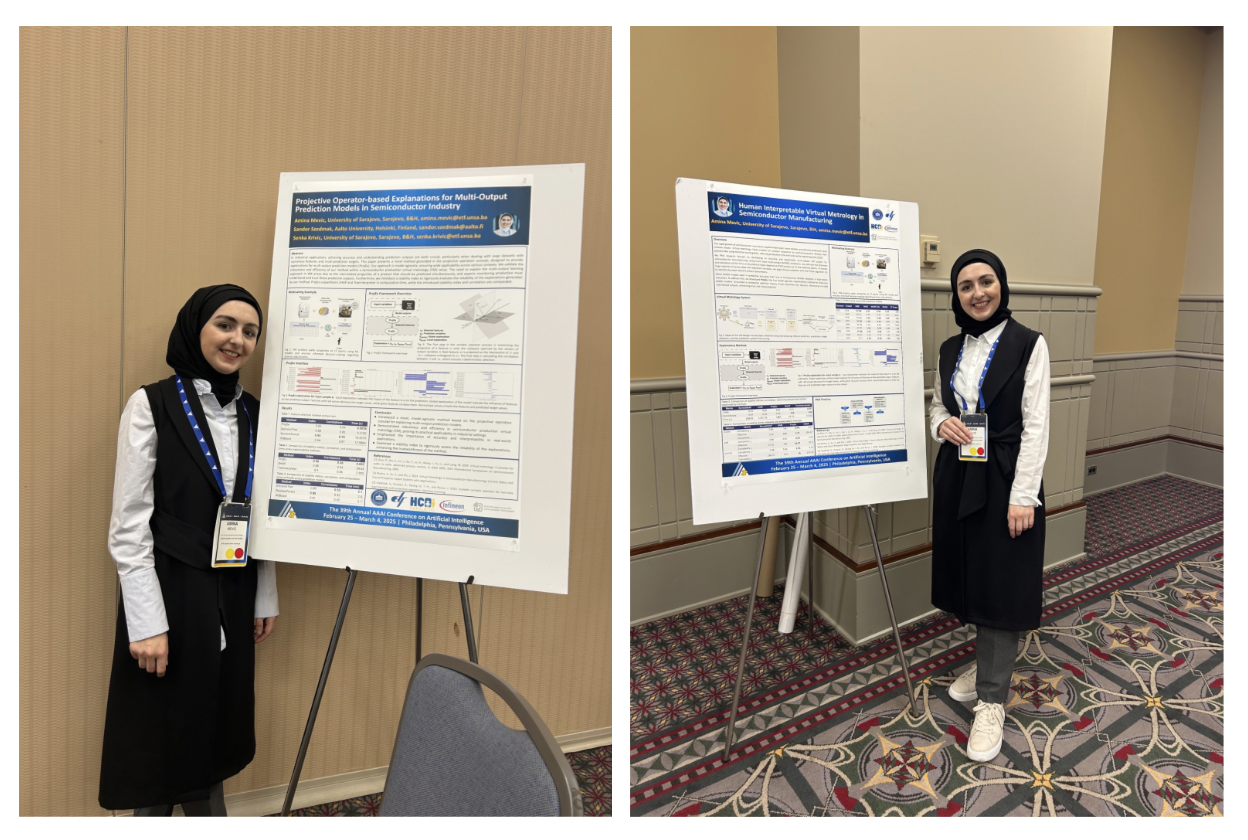Introducing Gemini 2.5 Flash
Introducing Gemini 2.5 Flash
Introducing Gemini 2.5 Flash
Introducing Gemini 2.5 Flash
Introducing Gemini 2.5 Flash
Giving quadcopter drones the ability to carry out precise flight maneuvers autonomously
Feasibility Studies for Robot Applications: The Key to Successful Project Launch
Finger-shaped tactile sensor advances robotic touch with multi-directional force detection and material identification
Interview with Amina Mević: Machine learning applied to semiconductor manufacturing

In a series of interviews, we’re meeting some of the AAAI/SIGAI Doctoral Consortium participants to find out more about their research. In this latest interview, we hear from Amina Mević who is applying machine learning to semiconductor manufacturing. Find out more about her PhD research so far, what makes this field so interesting, and how she found the AAAI Doctoral Consortium experience.
Tell us a bit about your PhD – where are you studying, and what is the topic of your research?
I am currently pursuing my PhD at the University of Sarajevo, Faculty of Electrical Engineering, Department of Computer Science and Informatics. My research is being carried out in collaboration with Infineon Technologies Austria as part of the Important Project of Common European Interest (IPCEI) in Microelectronics. The topic of my research focuses on developing an explainable multi-output virtual metrology system based on machine learning to predict the physical properties of metal layers in semiconductor manufacturing.
Could you give us an overview of the research you’ve carried out so far during your PhD?
In the first year of my PhD, I worked on preprocessing complex manufacturing data and preparing a robust multi-output prediction setup for virtual metrology. I collaborated with industry experts to understand the process intricacies and validate the prediction models. I applied a projection-based selection algorithm (ProjSe), which aligned well with both domain knowledge and process physics.
In the second year, I developed an explanatory method, designed to identify the most relevant input features for multi-output predictions.
Is there an aspect of your research that has been particularly interesting?
For me, the most interesting aspect is the synergy between physics, mathematics, cutting-edge technology, psychology, and ethics. I’m working with data collected during a physical process—physical vapor deposition—using concepts from geometry and algebra, particularly projection operators and their algebra, which have roots in quantum mechanics, to enhance both the performance and interpretability of machine learning models. Collaborating closely with engineers in the semiconductor industry has also been eye-opening, especially seeing how explanations can directly support human decision-making in high-stakes environments. I feel truly honored to deepen my knowledge across these fields and to conduct this multidisciplinary research.
What are your plans for building on your research so far during the PhD – what aspects will you be investigating next?
I plan to focus more on time series data and develop explanatory methods for multivariate time series models. Additionally, I intend to investigate aspects of responsible AI within the semiconductor industry and ensure that the solutions proposed during my PhD align with the principles outlined in the EU AI Act.
How was the AAAI Doctoral Consortium, and the AAAI conference experience in general?
Attending the AAAI Doctoral Consortium was an amazing experience! It gave me the opportunity to present my research and receive valuable feedback from leading AI researchers. The networking aspect was equally rewarding—I had inspiring conversations with fellow PhD students and mentors from around the world. The main conference itself was energizing and diverse, with cutting-edge research presented across so many AI subfields. It definitely strengthened my motivation and gave me new ideas for the final phase of my PhD.
 Amina presenting two posters at AAAI 2025.
Amina presenting two posters at AAAI 2025.
What made you want to study AI?
After graduating in theoretical physics, I found that job opportunities—especially in physics research—were quite limited in my country. I began looking for roles where I could apply the mathematical knowledge and problem-solving skills I had developed during my studies. At the time, data science appeared to be an ideal and promising field. However, I soon realized that I missed the depth and purpose of fundamental research, which was often lacking in industry roles. That motivated me to pursue a PhD in AI, aiming to gain a deep, foundational understanding of the technology—one that can be applied meaningfully and used in service of humanity.
What advice would you give to someone thinking of doing a PhD in the field?
Stay curious and open to learning from different disciplines—especially mathematics, statistics, and domain knowledge. Make sure your research has a purpose that resonates with you personally, as that passion will help carry you through challenges. There will be moments when you’ll feel like giving up, but before making any decision, ask yourself: am I just tired? Sometimes, rest is the solution to many of our problems. Finally, find mentors and communities to share ideas with and stay inspired.
Could you tell us an interesting (non-AI related) fact about you?
I’m a huge science outreach enthusiast! I regularly volunteer with the Association for the Advancement of Science and Technology in Bosnia, where we run workshops and events to inspire kids and high school students to explore STEM—especially in underserved communities.
About Amina

|
Amina Mević is a PhD candidate and teaching assistant at the University of Sarajevo, Faculty of Electrical Engineering, Bosnia and Herzegovina. Her research is conducted in collaboration with Infineon Technologies Austria as part of the IPCEI in Microelectronics. She earned a master’s degree in theoretical physics and was awarded two Golden Badges of the University of Sarajevo for achieving a GPA higher than 9.5/10 during both her bachelor’s and master’s studies. Amina actively volunteers to promote STEM education among youth in Bosnia and Herzegovina and is dedicated to improving the research environment in her country. |
Generative AI in Healthcare: Use Cases and Future Outlook
Generative AI in Healthcare: Use Cases and Future Outlook
Generative AI originates content or information through Artificial Intelligence (AI) technologies based on learning knowledge from prompts. In recent years, incredible applications of the generative AI have been found within several sectors, primarily in healthcare as well. This article discusses the integration benefits of generative AI in healthcare, use cases, challenges, return on investment, and the outlook for the future.
Use Cases of Generative AI in Healthcare
- Drug Discovery
Generative AI basically comes up with novel molecular structures based on surveying huge chemical data after which it predicts those efficacy. This enhances the speed in drug discovery through rapid identification of promising compounds so that the expensive and time-consuming processes of making new drugs go down. - Medical Imaging
Generative AI generates highly detailed medical images and also supports the diagnosis of anomalies including tumors, fractures, or any other pathology. Through enhanced image quality and resolution, generative AI helps deliver accurate diagnoses most of the time by identifying some problems that could easily be left unnoticed by a human eye; early disease detection is also ensured. - Artificial Data Generation
Generative AI can make synthetic medical datasets that reflect actual patient data while maintaining their privacy intact. These synthetic data become great means of model training, research, and development of AI-enabled solutions in ways that preserve patient confidentiality, thus allowing more representative and robust studies. - Virtual Assistants
AI-powered virtual assistants give personalized health-related advices, reminders for medication intake, and answers to other health-related questions. Such assistants increase patient participation, provide persistent support, and lighten the burden of healthcare professionals by automatically responding to routine inquiries and administrative questions. - Administrative Automation
Generative AI can automate administrative time-consuming tasks like scheduling appointments, managing patient records, and billing. This minimizes the burden of administrative tasks on healthcare providers, increases the efficiency of operations, and helps medical professionals to spend more time on patient care.
Challenges in the Acceptance of Generative AI Models
- Data privacy and security
It is a significant challenge as protecting sensitive patient information will be critical because generative AI needs extensive data sets. Such an operation could create serious data breaches and misuse of private health information. - Regulatory Compliance
Following healthcare regulations like HIPAA (Health Insurance Portability and Accountability Act) and other regional regulations is a complicated task since generative AI tools must be extensively tested and pass rigid regulatory compliance requirements before deployment. - Bias and Fairness
Generative AI models can inherit the biases present in training data, making the predictions unfair or inaccurate. These models have to be free of bias and equitable across the patient population being diverse. - Integration with Existing Systems
This results in integration into existing systems where legacy technologies abound, making generative AI tool integration into well-established workflows complicated and often frustrating for healthcare providers. - Data Quality and Availability
AI models operate best on structured data of high quality, and many health organizations face the problem of patient data being either incomplete or not consistent, leading to AI generating less accurate insights. - Less availability of expertise
Generative AI needs healthcare professionals and data scientists with the right skills. Shortage in AI and machine learning expertise in healthcare has limited its adoption. - Implementation Cost
Establishing and integrating generative AI will be very costly since it demands advanced technologies, infrastructure, and highly skilled employees, making it unaffordable to a considerable number of small-sized healthcare institutions.
Future of Generative AI in Healthcare
Generative AI, when combined with precision medicine and personalized treatment planning, will open new vistas into more accurate diagnostics, the ultimate being diseases predicted even before symptomatology begins to occur. Even surgical systems shall become much more precise and low risk and ensure a rapid return to life before the patient gets operated on with AI-based systems.
Generative AI will also have a great role in increasing the accessibility of healthcare to all corners of the globe, especially in underprivileged areas. Affordable quality care will be provided through AI-based remote consultation and diagnosis in resource-poor regions. Further, AI will lead to the more independent health systems where routine work is performed by AI and experts can deal with critical cases, thereby increasing the efficiency of the whole system.
Conclusion
Generative AI is a revolutionary factor within the health world, ranging from discovering drugs all the way through making personalized treatment plans, to say the least of making radiological imagines. Another problem that existed was with regards to data privacy. Often overcoming barriers brings additional regulatory burden with it. Here, higher return on investment for better efficiency besides cost-cutting in patient care was noticed. This is much more achievable when full integration and maturity through health care have taken place. Indeed, the future of healthcare is tied up with this promise of generative AI, which promises solutions to global health problems.
Connect with Us today for Generative AI models!
[contact-form-7]